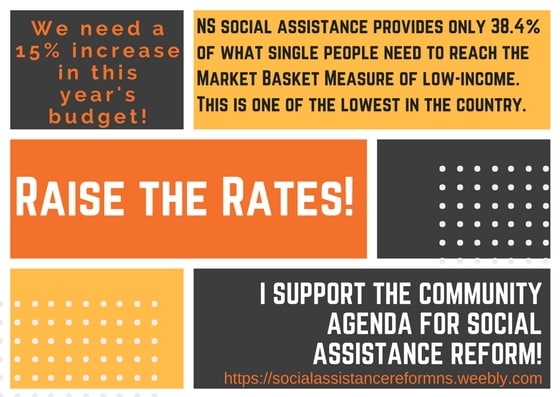KJIPUKTUK (Halifax) – “The best path out of poverty is a job,” Community Services (DCS) deputy minister Lynn Hartwell told a CBC reporter a couple of weeks ago.
Hartwell went on to announce an increase in the poverty reduction credit, and a decrease in the clawback of money earned by people on income assistance who have a job.
Earlier we pulled out our calculator and took a close look at that poverty reduction tax credit. Turns out not many people actually qualify, and even those lucky enough to get the raise will still be poorer today than they were in 2016.
But Hartwell’s musings about the clawbacks on earned wages and the liberating powers of holding a job warrant a closer look. In that interview Hartwell called the changes “likely the most significant this year.”
Fiona Traynor, a community legal worker for the Dalhousie Legal Aid Service believes that the reduced claw backs on earnings are a good thing, but that there is also a lot of hype in Hartwell’s pronouncements. They may even be dangerous.
“To say that the best way out of poverty is to get a job, while she herself says that only 10% of income assistance recipients work, and while we know from DCS that between 60% and 70% of recipients live with some kind of disability, that’s insulting. It totally disregards the reality of people who live in the deepest poverty. This only further stigmatizes them,” Traynor says.
Today people who receive social assistance while working are allowed to keep the first $150 of their earnings, and 30% of whatever they earn beyond that.
Under the new system, to be implemented in October of this year, you keep the first $250 of earned income each month, and they can keep 75% of wages between $250 and $500, half of any earnings from $500-$750 a month, and a quarter of wages between $750 and $1,000, Hartwell told the CBC.
No doubt recipients who have a (part time) job will be slightly better off. By how much better depends on the number of hours you worked, how much you make, how much taxes get deducted and so forth. No matter what, folks on assistance while working will still be very poor.
Apart from disabilities, there are other barriers that prevent people on income assistance from finding jobs.
No child care and in many cases no public transportation, especially in rural Nova Scotia, make it difficult for many to even think about a job.
Traynor is a member of the Community Agenda for Social Assistance Reform (CASAR), a broad coalition of anti-poverty groups and individuals, although in this interview Traynor does not speak on behalf of that group.
CASAR wants substantial changes to the social assistance system, and an immediate increase in the rates, “enough to live in dignity, to pay for all essentials, and enable people to look beyond daily survival to participate in the community.”
As well, the coalition wants meaningful consultation with the department, something that, despite the department’s claims, hasn’t happened, Traynor says.
“All these changes are made in private, and announced at press conferences or in one on ones with journalists,” Traynor says.
“I have been to these consultations. They are not collaborative, they are there only for the government to test their preconceived ideas. Questions are very well scripted.” says Traynor.
“They can call it what they want, but it isn’t consultation, and without real consultation they will never make the system more efficient.”
See also: Announced poverty reduction tax credit increase for income assistance recipients mostly bullshit
For more info on CASAR:
Visit the CASAR website
Email: socialassistancereform.ns@gmail.com
Like CASAR on Facebook
Follow CASAR on Twitter
If you can, please support the Nova Scotia Advocate so that it can continue to cover issues such as poverty, racism, exclusion, workers’ rights and the environment in Nova Scotia. A paywall is not an option, since it would exclude many readers who don’t have any disposable income at all. We rely entirely on one-time donations and a tiny but mighty group of dedicated monthly sustainers.




